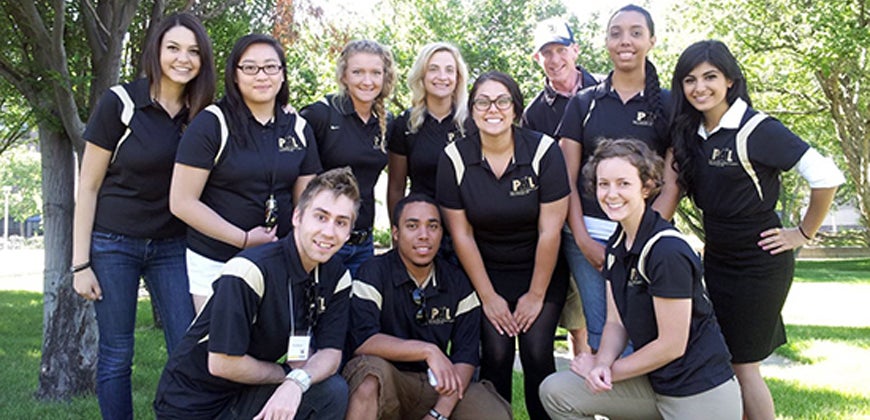PAL mentors assist freshmen Peer Advocacy Leaders at CU Denver

by Amy Vaerewyck | CU Denver University Communications
“Our daughter will need help,” one of the parents said to Mohan when they reached her. “We’re hoping you can help her.”
Mohan knew exactly what they meant—new country, new school, new education system. She’d been there herself, and now, as a Peer Advocate Leader (PAL), she knew it was her job to mentor the student.
“Of course,” she told the parents. She met with the girl, shared her own experiences and, nearly a year later, is still friends with her.
Mohan, a senior psychology major, is one of 21 PALs at CU Denver who provide mentoring and peer-level support for first-year students to help them feel comfortable on campus, succeed academically and, ultimately, graduate.
“Student-to-student mentoring can have a major positive impact on our students, their engagement on campus and their academic success,” said Khushnur Dadabhoy, assistant vice chancellor for Student Affairs. “PALs are a huge value to our students.”
Nearly 1,800 students served
Established in 2010, CU Denver’s PAL mentorship program meets international standards for certification by the College Reading & Learning Association and is led by Lynda Duran, MA, NCC, peer advocacy and student engagement coordinator.
“We started small, with nine mentors,” Duran said. “Since that first year, our working mentor pool has grown by 145 percent, and our total number of students served has increased by 782 percent.”
The PAL program’s goal is to increase student retention by providing undergraduate students the guidance, support and resources they need in their first year at college and beyond. During the 2012-2013 school year, PALs served 1,790 first-year students.
“PALs can say, ‘I’ve been in your shoes, and I struggled too,’” Duran said. “That’s better than a manual.”
PAL mentors reach many first-year students through New Student Orientation and First-Year Seminar (FYS). Seventeen FYS classes, each with as many as 24 students, receive weekly visits from PALs, who share information about campus happenings and work one-on-one with students who need it. They also confer with the instructing faculty member on upcoming deadlines, syllabus details and students who might face challenges.
“PALs get a different response from students than faculty do,” Duran said. “Faculty can seem scary to first-year students, because you put them on pedestal in your mind. PALs bridge that communication gap.”
1-on-1 support
First-years can also request an individual PAL, with whom they might schedule a weekly appointment, meet for breakfast, set goals or simply talk through issues.
“Sometimes you meet once or twice, sometimes you’ve got a year-long friend,” Duran said.
For PAL Nicholas Beers, it was the latter. The junior elementary education major found himself helping his mentee through intense life trauma and emotional issues. After consulting Duran for advice, Beers met with his mentee regularly to try to help.
“I just let [my mentee] talk for a really long time, and then I shared how I’d felt in a similar situation,” Beers said. “We bonded and connected on similarities we had with one another. [My mentee] is doing great now.”
100 percent graduation rate
The PAL program is designed to support freshman students, but it benefits the upper-classman mentors, too.
“I can’t tell you how amazing it fits into everything else I’m doing on campus,” said Mohan, who is also involved with the Student Government Association and with Educational Opportunity Programs. “We [PALs] have built this community of close-knit friends, and we’re helping each other, sharing internships and other opportunities.”
The PALs—who undergo a four-interview selection process—also go through about 55 hours of training over the course of a year, which earns them official peer advocacy certification. PAL mentors have a 100-percent graduation rate.
“I’ve seen a huge change in myself, professionally,” said Beers, who’s been a PAL since spring 2013. “I’ve improved my interpersonal communication skills and gained skills in giving speeches, scheduling and hosting meetings.”
Beers was inspired to become a PAL, because he looked up to his own PAL mentor when he was a freshman—a situation that, Duran said, is the ultimate measure of success for the program.
“That’s exactly what we want: to have this cycle of student outreach,” she said. “Through the PAL program, students can leave their legacy at CU Denver. They can say, ‘I came, I struggled, I helped.’”
Published: Feb. 24, 2014
Contact: stories@ucdenver.edu




